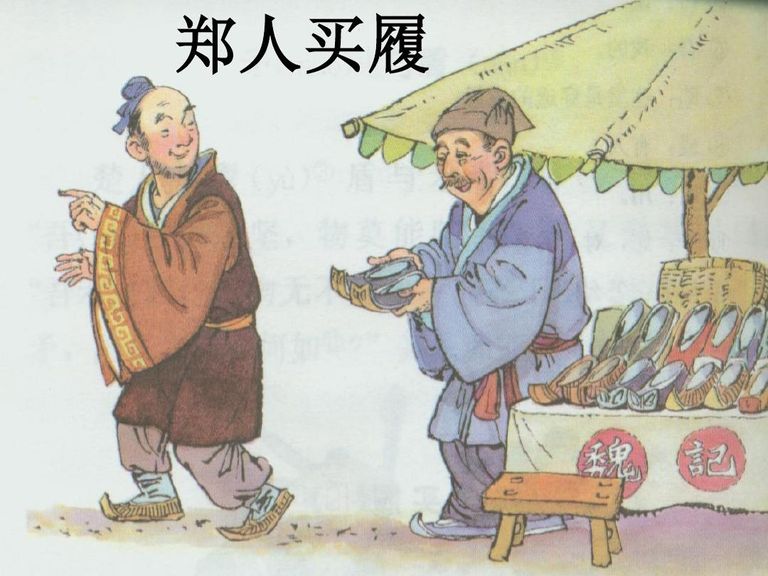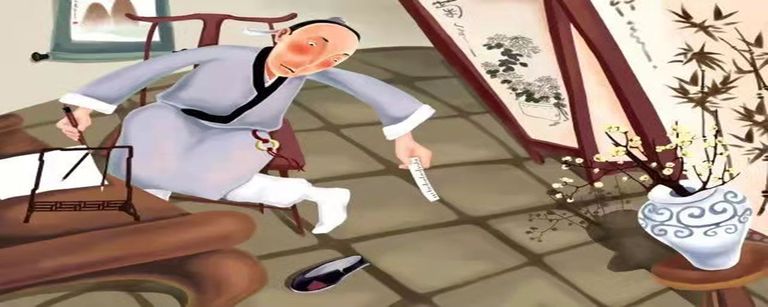
The idiom " the man who rather trusted his measurements than placing any confidence in his own feet when buying shoes" comes from a fable in Chinese, which tells the story of a person from the State of Zheng who was preparing to buy a new pair of shoes at a market during the Spring and Autumn period. Before going to the market, this man measured the size of his two feet with a rope, but he forgot it on the stool at home because he was in a hurry. It wasn't until he arrived at the market that the man realized he had forgotten to bring the measurements. He hurried home to get the measurements, but by the time he returned to the market, the market had already dispersed. This man was disheartened. Someone asked him after learning the reason for the matter, "Why don't you measure it with your feet?" This man said, "I would rather believe in the measured size than my own feet.”
This is just an ancient fable story, not truly happening in real life, otherwise, such a person would be a fool. Carefully analyzing, coould we say that in real life we are also more or less repeating the mistake of "the man from the State of Zheng who wanted to go into town to buy a pair of new shoes "?
1.Regarding marriage, what people value most is the matching of appearance, age, work, income, education, and family social and economic status, while whether two people truly love each other has regressed to a secondary position. This is the realistic standard of only believing in social values and the "size" of others' eyes, without believing in the comfort and happiness of one's own marriage. As long as two people truly love each other and have a happy marriage, this is enough, this is the standard. However, modern people regard “equal in social status” as the standard.
2.Regarding clothing, it should be said that when one feels comfortable and good-looking when wearing clothes, that’s OK, but modern people always consider others' opinions and seek their opinions to evaluate whether the clothes they are wearing look good. Treat others' opinions as the standard for buying clothes, without believing in one's own feelings and comfort.
3.Regarding their future prospects, many people always like to find celebrities to take their advices, treating their words as golden words and magic weapons to win, rather than believing in their life plans based on reality.
A young man aspired to become a writer and sent his work to writer Chen Zhongshi, hoping that he could receive guidance from a famous writer. But Chen Zhongshi was too busy to have time to read carefully, so he hastily wrote a letter saying, “It's well written, I hope you can continue to work hard” . After receiving the reply, the young man was overjoyed and strengthened his confidence and determination to continue on the path of being a writer. But in the end, the young man failed to become writers and even missed out on more things in life. Chen Zhongshi felt guilty after learning about it.
Isn't it sad for young people to use the words of celebrities as "size" to guide his future, without believing in his actual situation, and thus continue to go on unrealistically?
The story of "the man from the State of Zheng who wanted to go into town to buy a pair of new shoes" is laughable, but little do we know that in many things, we are still striding forward in the footsteps of the man from the State of Zheng. Knowing only the sorrow of others without knowing one's own sorrow is truly the saddest thing!
成语“郑人买履”来自汉语中的一则寓言故事,说的是春秋时期有一个小国郑国里的一个人准备到集市上买一双新鞋子的故事。这个郑国人去集市前,用绳子测量好了自己两只脚的尺寸,可因为走得匆忙而遗忘在了家里的凳子上。直到到了集市上,这个郑国人才发现忘了带尺寸来,他便匆匆赶回家里去拿尺寸,可待他再返回到集市上时,集市早已散了。郑人垂头丧气,有人得知事情的缘由后问他:“为什么不用你的脚量一下呢?”这个郑国人说:“我宁可相信测量出来的尺寸,也不相信自己的脚。”
这只是一则古代寓言故事,而非真正地发生在现实生活中,否则,这样的人就是傻子。可仔细分析一下,现实生活中的我们是不是或多或少地也在重蹈着“郑人买履”的覆辙呢?
一、关于婚姻,世人多看重的是门当户对——外貌、年龄、工作、收入、学历及家庭社会和经济地位是否匹配,而至于两个人是否真心相爱倒退到了次要的地位。这就是只相信社会观念和别人眼神这样的“尺寸”,而不相信自己的婚姻是否舒适、幸福这样的现实标准。只要两个人真心相爱,婚姻美满,这就足够了,这就是标准;可现代人却把“门当户对”当作了标准。
二、关于穿着,按说应该是自己觉得衣服穿着舒服、好看就足够了,可现代人总是顾及别人的眼光,总要征询别人的意见,让别人评价一番自己穿的衣服是否好看。把别人的看法当作自己买衣服的标准,而不相信自己的感觉和舒适度。
三、关于前程,许多人总喜欢找一些名人来为自己的前程把脉,把名人的话当作金口玉言,当作制胜的法宝,而不相信自己基于实际而做出的人生规划。
有一个青年立志要当作家,便把自己的作品寄给了作家陈忠实,希望你能够得到名家的指点。可陈忠实实在是太忙了,根本没有时间仔细看,便草草回书一封:写得不错,望继续努力。年轻人收到回信后欣喜若狂,更坚定了在作家这条路上走下去的信心和决心。可最终年轻人没能当上作家,还把人生里更多的东西都错过、丢掉了,陈忠实得悉后很是内疚。
年轻人把名人的话当作“尺寸”,用以指导自己的前程,而不相信自己现实的状况,从而不切实际地一直走下去,不是很可悲吗?
郑人买履的故事令人可笑,殊不知,在许多事情上,我们还在步着郑人的后尘阔步前行。只知道别人的悲哀,而不知自己的悲哀,真的是悲哀之至!

Your post was a little funny, but there was a lot to learn. Thank you so much for sharing such a beautiful post.
Thanks for your kind comment and support. Good day to you.
Thank you so much for replying to my comment and giving my comment an upvote. Be well and be healthy.
Good luck and good health to you.
The story sounds laughable but it can make you reflect on it. Thanks for sharing! I enjoyed reading your post and somehow learning too.
Thanks for your valuable comment and continous support to me. Good day to you.
Congratulations, your post has been curated by @r2cornell-curate. Also, find us on Discord
Felicitaciones, su publication ha sido votado por @r2cornell-curate. También, encuéntranos en Discord
Many thanks to you.